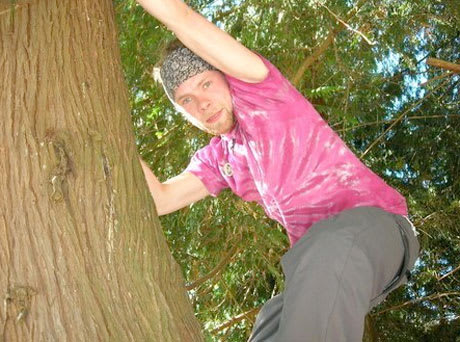An unseen cameraman interviews seven very different people in a British Columbia logging community in The Green Chain, the ambitious but flawed faux-documentary by playwright Mark Leiren-Young.
The community is bracing itself for a huge anti-logging protest with a special appearance by movie star Leila Cole (Battlestar Galactica's Tricia Helfer), and the interviewees are sharply divided between staunch environmentalists and supporters/members of the logging industry. The protesters say the environment is at a crisis point and that logging needs to be more strictly regulated. The loggers depend on the industry for their livelihood.
This is a fascinating dilemma and the frustrating thing about The Green Chain is that it has everything in place to be much better than it is. Leiran-Young's screenplay is thoughtful in the way it refuses to endorse or condemn any of its characters, and his inventive structure only gradually reveals how the characters are connected. The actors are all quite competent, and sometimes considerably more. It's not hard to see why they were attracted to this material; they each get a chance to stretch their "naturalism" muscles with enough stammers, eye dodges and reflective pauses to make Lee Strasberg proud.
The problem is that we're always too aware we're watching performances. The off-screen interviewer almost never speaks, instead allowing his subjects to ramble in confessional tones to the camera, and I never once believed that any of these characters would reveal themselves so nakedly and with so little prodding to a cameraman they barely knew.
When coupled with the implausibility of the characters' monologues, the actors' naturalistic mannerisms become glaringly obvious and every twitch, gulp and "um" and "er" feels calculated. The Green Chain's idea of naturalism couldn't be more antiseptically unnatural if it were rendered in cartoon form.
My query: why couldn't Leiren-Young have let the cameraman speak? Jean-Luc Godard employed a similar off-screen questioner in his seminal Masculine-Feminine and by giving the interviewer a voice he was able to reveal more about the characters by the way they reacted to his questions.
Wouldn't it have been more interesting to see The Green Chain's characters hold back a little? Wouldn't they have seemed richer and more complex if certain topics required more active pursuing from the cameraman? Wouldn't they have seemed more real?
(Kinosmith)The community is bracing itself for a huge anti-logging protest with a special appearance by movie star Leila Cole (Battlestar Galactica's Tricia Helfer), and the interviewees are sharply divided between staunch environmentalists and supporters/members of the logging industry. The protesters say the environment is at a crisis point and that logging needs to be more strictly regulated. The loggers depend on the industry for their livelihood.
This is a fascinating dilemma and the frustrating thing about The Green Chain is that it has everything in place to be much better than it is. Leiran-Young's screenplay is thoughtful in the way it refuses to endorse or condemn any of its characters, and his inventive structure only gradually reveals how the characters are connected. The actors are all quite competent, and sometimes considerably more. It's not hard to see why they were attracted to this material; they each get a chance to stretch their "naturalism" muscles with enough stammers, eye dodges and reflective pauses to make Lee Strasberg proud.
The problem is that we're always too aware we're watching performances. The off-screen interviewer almost never speaks, instead allowing his subjects to ramble in confessional tones to the camera, and I never once believed that any of these characters would reveal themselves so nakedly and with so little prodding to a cameraman they barely knew.
When coupled with the implausibility of the characters' monologues, the actors' naturalistic mannerisms become glaringly obvious and every twitch, gulp and "um" and "er" feels calculated. The Green Chain's idea of naturalism couldn't be more antiseptically unnatural if it were rendered in cartoon form.
My query: why couldn't Leiren-Young have let the cameraman speak? Jean-Luc Godard employed a similar off-screen questioner in his seminal Masculine-Feminine and by giving the interviewer a voice he was able to reveal more about the characters by the way they reacted to his questions.
Wouldn't it have been more interesting to see The Green Chain's characters hold back a little? Wouldn't they have seemed richer and more complex if certain topics required more active pursuing from the cameraman? Wouldn't they have seemed more real?
